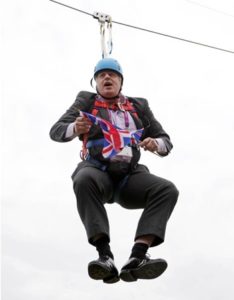
One of Pfeffer’s 7 rules of power is that “Success Excuses (almost) Everything: Why This is the Most Important Rule of All. Which perhaps explains why Britain’s Boris Johnson was able to hang onto power for so long…. And perhaps why he finally lost it.
Jeffrey Pfeffer is a dear colleague and a long-time faculty member at Stanford University, where he teaches its most popular MBA elective, all about power. He has a great new book out – “7 Rules of Power: Surprising – but true – Advice on How to Get Things Done and Advance Your Career.” I very much enjoyed our LinkedIn Live conversation on the topic. If you missed it, you can watch the replay at this link.
What is both enlightening (and a little disturbing) about the book is how clearly it lays out that the world we would like to think we live in – one in which authenticity, transparency, honesty and so on prevail – is not the world we live in. As he points out, to win at any game you need to understand the rules. There’s no point complaining that you don’t like the rules of baseball if your ambition is to play in the World Series. Similarly, it’s a waste of breath to complain that you don’t like the rules of human social order if you want to triumph in that game. As he points out, if you want to change the world for the better, you need to have power. That’s because those who have power today create systems to keep it that way!
The Seven Rules
Rule 1: Get Out of Your Own Way
This rule basically says that if you think going for power is unethical, unpleasant or not for you, you are highly unlikely to succeed at getting it. Of note is the “imposter syndrome,” that uneasy feeling that many extremely accomplished people have that they don’t deserve the accolades they’ve received or don’t belong amongst a group of other distinguished people. Jeff suggests, start there – if you don’t believe you deserve to be in a powerful position, nobody else is likely to either.
Rule 2: Break the rules
Most of us conform to accepted social norms. After all, in an organized society, you can’t have everybody just doing their own thing. The paradox, however, is that the rules currently in place reinforce the status quo. To change the status quo, you need to break them. If you think about the great social change leaders of our time – Martin Luther King, for example – they often spent some time in jail for violating the rules of the day. More prosaically, powerful groups can get their way with the rules, regardless of their impact on everybody else. For instance, a ban on selling packaged liquor in Indiana (only recently repealed) was promoted by the state’s liquor store lobby who wanted to enjoy a day off without worrying about competition from other retailers (who were prohibited from selling hard liquor).
Rule 3: Appear powerful
Much to the frustration of those who would just like to show up to work and get on with it, Pfeffer’s research (and that of many others) finds that looking and dressing the part matters. This extends to language as well – much to my chagrin as an occasionally long-winded academic, powerful people use short, simple words that are not nuanced and are easy to understand. See also “How Donald Trump Answers a Question.”
Rule 4: Build a Powerful Brand
Talking about a personal brand may seem unpleasantly commercial. And yet, until others understand what you stand for (and don’t stand for) it’s hard for them to decide whether to join your cause or not. If you don’t create your own narrative, you’re letting other people make it up for you. And powerful brands don’t just giggle to themselves in corners – they get the word out. Engage – social media, conversations, conferences – all ways to communicate to the world what you’re all about.
Rule 5: Network relentlessly
I know, I know, for many people the very thought of networking makes some people cringe. But if you want to attract support, get more resources, get better noticed and discover new information, you need a relationship with the people who have those resources. Everyone has choices about where they spend their time and attention (as well as money). Give them a reason to spend those things on you. One more thing – you need two kinds of networks. Dense networks full of trust help you get stuff done. Spread-out networks full of weak ties help you learn and discover information you didn’t know. Budget time for networking.
Rule 6: Use your power
Once you have power, that should be it, right? Actually no, Jeff points out (in a chapter that made me feel a little squeamish). If you want to get stuff done, you must put that power to use or you are going to lose it. Getting rid of rivals, even when they are high performing, is a manifestation of this. When an opportunity arises, you have to move fast to show people how much power you have. And then, as part of the logic underpinning the book, put in place rules that perpetuate your power (this is why Mark Zuckerberg can’t be fired).
Rule 7: Success excuses (almost) everything: Why this is the most important rule of all
Why in the whole of the great recession was not a single white-collar perpetrator of the activities that led to it all not charged with any crimes? Why did Elizabeth Holmes manage to hang on to such a strong positive image even after there were obvious signs that something was terribly wrong at Theranos? Why do corporate Directors who oversee disasters at companies seldom face any consequences at all? Andrew Ross Sorkin offers examples. The answer, as Pfeffer points out, is the tight connection between social ties and power. We rarely punish those who are like us or who are part of our social circles.
So what happened to Johnson?
Well, the first thing to observe is that despite being what some have called “the worst Prime Minister in British History” Johnson has been Mayor of London twice, was pivotal in the 2016 Brexit decision and won his 2020 election handily. The guy knows a thing or two about power. He never appears in doubt. He regularly breaks the rules. He appeared powerful – often described as charismatic, with his own distinctive style. His brand was strong and unique. From his time at Eton throughout his career, he managed to rally supporters and create allies. And he certainly seemed immune from any penalties for behaving in an unconventional, chaotic way.
Here’s a picture of one of his less distinguished, but brand-consistent, moments – hanging from a helicopter at the London Olympics.

Source: https://www.bbc.com/news/uk-politics-59966249
So what went wrong? I think it very may well have been that he broke Rule #5 about using his power. As Sam Knight, an observer wrote in the New Yorker “… Johnson’s constant lying was only a symptom of a deeper condition, which is an absence of purpose for being in government at all.” As Pfeffer points out, people want to be around those who get things done and reflect success. As Johnson increasingly fielded scandal after scandal, his support base – first gradually, and then suddenly – collapsed. And that, dear readers, was that.
What’s new at Valize
We’ve just graduated our first cohort of learners from our on-line creating customer insight program. A new cohort is forming for the fall which will begin in September. Our SparcHub software is live! And we have a bunch of clients working with us on their capability-building journeys. Learn more by visiting https://www.valize.com/. If growth, change or transformation are on your agenda, we should talk! Growth@valize.com will find us.
